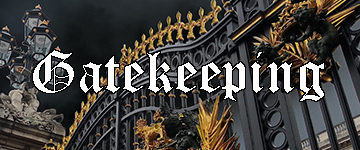



Gatekeeping, (also called 'gatekeeper bias'), is the process through which information is filtered or censored before dissemination, whether for publication, broadcasting, the Internet, or some other mode of communication.
Gatekeeping occurs at all levels of the media structure — from a reporter deciding which sources are chosen to include in a story, to editors deciding which stories are printed or covered, and includes media outlet owners and advertisers. Individuals can also act as gatekeepers, deciding what information to include in an email, what topic to bring up in a conversation, what sources of information to trust or what is morally 'right'.
In Logic: When constructing an argument, 'gatekeeping' is deciding which factors to take as premises (or axioms accepted without proof) and which factors to ignore. (See also 'frame problem'.)
In Ethics: Ethical discourse is highly dependent on generally accepted values of right and wrong, good and bad. As such, the biases of the 'crowd' and the ruling groups in a society are the 'gatekeepers' who decide what material is admitted for consideration in an ethical discussion or argument.
In Advertising: The advertisements a person sees are a direct statement of the forces with money, power and influence in our society.
This page is a collection of instances of gatekeeping I observe from day to day (an on-going collection).
INDEX
LOGIC
ETHICS

1. Fertility struggles can be costly and time consuming. Living with a disability can make them even harder
An ABC News article and TV news segment shown on 13th July 2023.
The article features a woman with brittle bone disease (a cruel and debilitating genetic disease), who wants to have a baby by IVF. Because of her condition she can't work and lives on the invalid pension. She knows that if she has a child, it will probably have the debilitating and excruciatingly painful condition that she has, but pleads that she will be a good parent, and it is her human right to have a child.
online news article local copy
The article appeals to the emotions of readers: why should a person with a genetic disorder not receive government funding for IVF. It is her right to have a child!
The article is a good example of 'gatekeeping' in logic/ethics. (Where an argument is constructed within a highly restricted set of relevant factors.)
If you only consider modern ideas of anti-discrimination, the article's argument is compelling. However, several major considerations have been excluded from consideration — by the 'gatekeeper'.
Firstly, the article assumes (states without explanation) that every person has a human right to have children — a 'child'. This however, is a very loose interpretation of Article 16 of the Universal Declaration of Human rights:
Article 16: 1. Men and women of full age, without any limitation due to race, nationality or religion, have the right to marry and to found a family...(link)
The 'right' exists for married couples and the limitation of genetic abnormality is not excluded.
Secondly, the rights of the (potential) unborn child are excluded from the argument. If you admit modern notions of child maltreating and abuse into the logic, you find a woman who intends to produce a child who is 50% likely (link) to have a life of constant pain and disability. Should this woman's desire to have a child over-rule the real possibility of dooming another individual to a life of agonising pain.
Say you look at the woman's life situation. She has never worked. She cannot, because of her debilitating condition. She exists on the invalid pension and there is every liklihood her child will be dependent on the invalid pension for life. I am not saying she should not have a child, but the notion that a Government should financially subsidise her efforts to do so, is justified by considering only one aspect of the ethical picture. Other considerations are excluded by the gatekeeping process.


2. Police banned from Mardi Gras parade
SBS News article 28th February 2024. (online article)
A major news article this week has been the murder of a gay male couple. A serving police officer stands accused of shooting them with his service revolver and hiding their bodies in bushland.
NSW police have marched in the annual Mardi Gras parade in Sydney for 20 years, but this year, the Sydney Gay and Lesbian Mardi Gras board on Monday asked police not to take part in Saturday's march, due to the 'additional distress it could cause the LGBTIQ+ community following the alleged murders of Jesse Baird and Luke Davies by a serving officer.'
The gatekeeping in operation here is the association of a police officer with the murder of two gay men. Which seems quite straight forward, until you consider that the policeman charged with murder happens to be a gay man. (Stories of stalking and harassment have been circulated.) Why aren't they banning gay males from marching?
Why is the accused murderer's being a policeman given more weight than his being a gay male?
If you are going to ban policemen (and police women) from marching, aren't you being unjust to the women?
Trying to analyse the ethics of this ban opens the proverbial. (Hate to say it but 'can of worms.')
If you apply the same logic, we can expect to see march attendees visibly distressed when they see uniformed police managing march security and crowd control. Surely the police security entourage should be similarly dismissed.
I know it is a hackneyed trope that gay people are bitchy and vengeful. But I certainly hope the police service will refuse to provide security and crowd management for the march. (Out of respect, of course!)
ADVERTISING


1. Smart TVs Directing Audiences to Pay-Per-View Services
Date: 23rd November 2023 ABC News.
You may have noticed, when you first start up a new smart TV, that links to streaming apps such as Netflix, Apple TV+ & Prime automatically flash up on the screen, and you must search for, and install apps for the free-to-air services.
This is an example of 'gatekeeping' in advertising: only the options put out by the big players in the industry are presented and easily accessible. We must presume that the TV manufacturers receive payment for promoting these commercial enterprises.
The same sort of 'advertising gatekeeping' happens whenever you use a major online search engine. For example, Google search keeps a profile of you as a user, and promotes, in its search results, the offerings of their paid advertisers, sorted via a filter of your interests and perceived needs.
You have to go well down the list before you find any entry that is an unbiased answer to your query.
The ABC News article, (quoted above), concerns proposed federal government legislation that will force manufacturers to pre-program their TVs with links to the free-to-air services, and give those links preference over the pay-per-view links.
MANUFACTURING POPULAR OPINION
REFERENCES